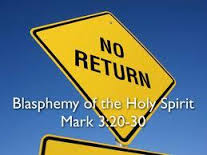Blog Archives
WHAT IS THE UNFORGIVABLE SIN?
“Every sin and blasphemy will be forgiven men, but the blasphemy against the Spirit will not be forgiven,” (Mt 12.31).
We should begin with what it is not.
- Some will argue that salvation comes by believing in Jesus Christ as your Lord and Savior. If this is true, then “unbelief” would be the unforgivable sin. That is, if I’m not saved because I don’t believe in Jesus, then unbelief is the only sin God will not forgive. If this is true, then wasn’t I committing an unforgiveable sin the entire time I didn’t believe in Jesus prior to the point that I actually did? In essence, I was committing the unforgivable sin of unbelief until I believed in Jesus and was forgiven.
- Not being baptized by water. Some argue that salvation occurs at the moment of immersion in water. If this is true, then not being baptized by water is the unforgiveable sin. Until one is immersed in water, they are committing an unforgiveable sin that is forgiven when they undergo the ceremony of water baptism.
You see the logical disconnect in each of these beliefs: God forgives the unforgiveable when we do something to change His mind about our condition. Unforgiveable means unforgiveable, not forgiven if you really mean it.
So what is the unforgiveable sin?
This “sin that leads to death” (1John 5.16), the Greek, “blasphemeo,” is also translated as “slander,” “dishonor,” or “malign,” which packs significance when we consider who it is that can do our name most harm through slander, dishonor or maligning. When strangers malign us, it’s not blasphemy because those who know us are not fooled. However, when those who know us dishonor our name, even strangers see us for fools. The only ones who can blaspheme God are those who claim to know Him, not those who do not call Him Lord.
God chastises the Jews by asking, “You who boast in the Law, through your breaking the Law, do you DISHONOR God? For ‘The Name of God is BLASPHEMED among the Gentiles because of you’” (Rom 2.23-24). Blasphemy occurs when those called the people of God “profane [His] holy name” (Ezek 36.20) by living contrary to His commands and “because of them the way of truth will be maligned [blasphemeo]” (2Pt 2.2). Jesus’ warning about blaspheming wasn’t given to nonbelievers who struggle with unbelief but to Pharisees, the spiritual leaders of His day, who were a “brood of vipers” and “hypocrites” who will “give an account on the day of judgment for every careless word” they’ve spoken (Mt 12.25-37). They were God’s teachers who believed and taught contrary to what God actually said.
So why is blasphemy against the Spirit unforgiveable? There exist only two impossibilities concerning God: “it is impossible for God to lie” and His Nature cannot change—He can’t stop being God (Heb 6.17-18). Blasphemy maligns God’s Word by turning it into a lie and presents God’s character contrarily to how He represents Himself in Scripture. When Moses hit the rock rather than speak to it, Uzzah stabilized the ark, or Herod didn’t deny being a deity, God could not forgive them because their actions maligned God’s character. Jesus said, “Things that cause people to sin are bound to come, but woe to that person through whom they come. It would be better for him to be thrown into the sea… than for him to cause one of these little ones to sin.” God cannot change; therefore, He cannot forgive those who try to change His Word or the representation of His character.


